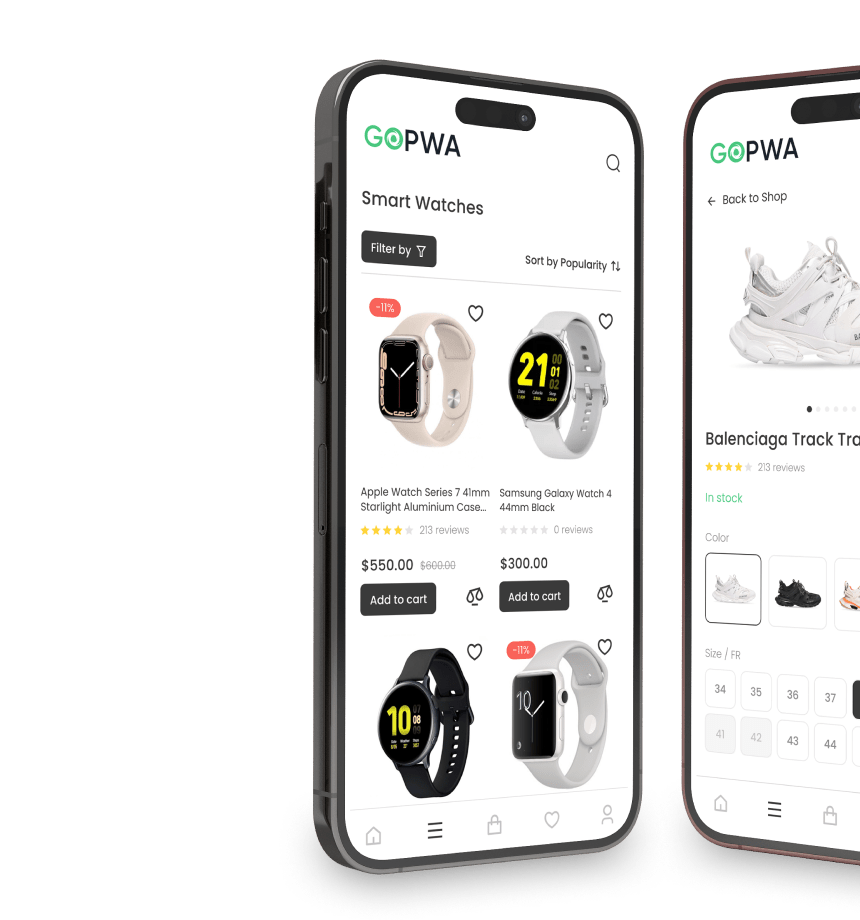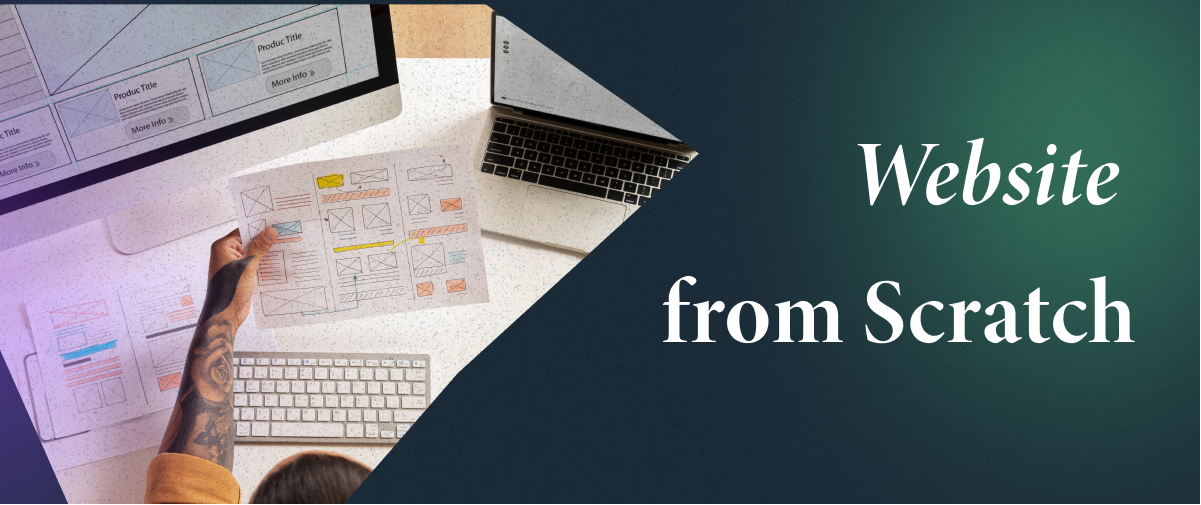Planning to launch an eCommerce website? Then you definitely need to know how much time it will take. In this article, we’ll provide you with a typical website development timeline and the factors that might influence it. Read on.
Once you decide you need a website for your eCommerce business, the two most common things are on top of your mind — the website development cost and timeline. Well, the only answer you can expect to the question “How long does it take to build an eCommerce website?” is “It depends”.
Crafting a timeline for your website involves numerous considerations. The first one of them is how are you going to build your website — by hiring an agency or by using a website builder. If you choose to work with an agency, the process can take as little as several months to launch the website. Utilizing a website builder allows you to create a basic website in as little as two hours.

Let’s have a closer look at both options.
If you hire an agency
The website development timeline involves multiple stages. The duration allocated to each stage directly corresponds to its specific objectives and level of complexity. Let’s examine each step and see the time they might require.
Stage 1. Discovery & Planning
Based on the industry expertise and benchmark data, the development team creates a thorough project plan that caters to the client’s immediate needs while also ensuring the project’s sustainability in the long run.
Time needed:
1-3 weeks for basic store development
4-8 weeks for custom development from scratch
Consulting Get your website back on track to high profits. We’ll identify what’s wrong with your website, choose the best tools, and fix any issues keeping your business from growing.

Stage 2. UX Design
The team conducts a meticulous analysis of users’ needs, behaviors, and expectations, which serves as the foundation for crafting an intuitive, efficient, and enjoyable interface and interaction.
Time needed: 2-4 weeks
Stage 3. Web Design
The team’s primary focus is on gaining a clear understanding of the client’s vision for the website’s design, layout, and content. This enables them to create a visually appealing design that not only enhances recognizability but also aids in converting visitors and leaving a lasting impression.
Time needed: 3-6 weeks
Stage 4. Development
The development team adheres to industry-leading coding standards, ensuring that the online store remains scalable, secure, and easily maintainable in the long term.
Time needed: 2-12+ months depending on the project’s complexity
Stage 5. QA, Testing & Bug Fixing
The website development team conducts rigorous testing on the website across development, staging, and live environments to ensure it functions as intended and meets all the specified requirements before launch.
Time needed: 2-12+ months
Stage 6. UAT Testing
The website is thoroughly tested from the user’s perspective to gather feedback on its usability, accessibility, and overall user experience, ensuring that it meets the user’s expectations.
Time needed: 2-4 weeks depending on the client’s team members’ availability

Stage 7. Launch
During the launch stage, the fully developed and tested website goes live, becoming accessible to users.
Time needed: 1 day
Stage 8. Support
The team continues to provide ongoing support for the website after its launch, offering assistance with bug fixes, implementing new features, performing updates, enhancing design elements, handling marketing initiatives, ensuring security measures, and more.
Time needed: Ongoing/on demand
If you use a website builder
A website builder is a good choice for an eCommerce website when:
- The budget is limited and there is a need for cost-effective solutions
- The business has relatively simple requirements and does not need complex customizations
- The website owner has limited technical knowledge and prefers a user-friendly, drag-and-drop interface
- Quick setup is crucial, and there is a need to launch the website in a short timeframe
- The eCommerce store is small to medium-sized with a limited product catalog
- The website does not require advanced integrations or extensive third-party plugins
- The platform offers responsive templates that work well on different devices
- The website owner wants access to built-in features like payment gateways and inventory management
- Minimal ongoing maintenance and technical support are sufficient for the business’s needs
Factors influencing the timeline of eCommerce website development
The timeline for developing an online store can vary significantly, impacted by various factors that influence its complexity, customization, and overall functionality. Understanding these influential elements is crucial for eCommerce businesses, as it helps set realistic expectations and facilitates smooth project management.
#1 Off-the-shelf vs. Custom website
The primary factor influencing the overall development time is the choice between custom and off-the-shelf websites. Opting for a fully customized eCommerce website can result in a superior user experience, but it comes with higher costs and a longer development period.
That’s why many eCommerce entrepreneurs and business owners nowadays prefer platforms like Shopify or other “off-the-shelf” website builders for their stores. These platforms offer a wide range of tools to set up a website and deliver a high-quality user experience without the need to build the entire website from scratch.
Custom website development is like crafting a tailor-made suit, personalized to fit the unique requirements and preferences. It demands time and effort, but results in a website perfectly tailored to the business. On the other hand, off-the-shelf solutions are like ready-to-wear outfits, offering quicker and more affordable options with pre-designed templates and functionalities that suit most businesses. While not as bespoke, they expedite the development process.
#2 Product range
The number of products you wish to sell significantly impacts the development time of your eCommerce store. Each product requires its own dedicated webpage, including product descriptions, images, customer reviews, and other essential elements crucial for driving sales.
If your store encompasses a vast inventory, with thousands or tens of thousands of products, this aspect can become one of the most time-consuming parts of launching your eCommerce venture. Nevertheless, it is an indispensable aspect that cannot be neglected. High-quality product descriptions and images are vital for customers to comprehend your offerings, make informed decisions, and ultimately convert into buyers.

#3 A customer support solution
This involves careful consideration of handling customer complaints, returns, and related matters. Depending on the scale of your eCommerce store, you might need to hire additional customer support staff.
An optimal approach often involves incorporating a customer support tool, such as Zoho Desk or Zendesk, directly into your website. Dedicated customer support platforms seamlessly integrate with eCommerce platforms like Shopify, providing you with robust tools that elevate the overall customer experience.
#4 Payment gateways & Shipping
The majority of eCommerce platforms come equipped with integrated payment gateways and shipping solutions. However, if you prefer alternative options or are constructing a custom website, collaboration with your developers becomes necessary to identify and implement the suitable solution for your store. This process might span several days or even weeks, depending on the complexity of your store.
Regular testing of these integrations is essential to ensure their proper functionality and to avoid any billing or shipping problems for your customers when your website is ready for launch.
#5 SEO & Digital Marketing
This aspect holds crucial significance in the website development process. Whether you opt for a custom website or utilize platforms like Magento, allocating time for SEO optimization and preparing for future digital marketing campaigns is essential.
SEO, or “search engine optimization” comprises a set of best practices aimed at improving your website’s ranking on search engines like Google. This task requires considerable effort and expertise, even if you collaborate with professional agencies or web developers, as it can extend the overall timeline of your website project.
Despite the effort, investing in top-notch SEO ensures that your eCommerce store is primed for success and paves the way for effective digital marketing campaigns on platforms like Facebook and Google, thereby benefiting your store in the long run.
Final word
Building an eCommerce website is a multifaceted endeavor that demands careful consideration of various factors that can impact its development timeline. Whether you choose a custom website or an off-the-shelf solution, understanding the key influencers is vital for making informed decisions and setting realistic expectations.
If you have a project in mind and want to know how much time it will take, don’t hesitate to reach out to us.






